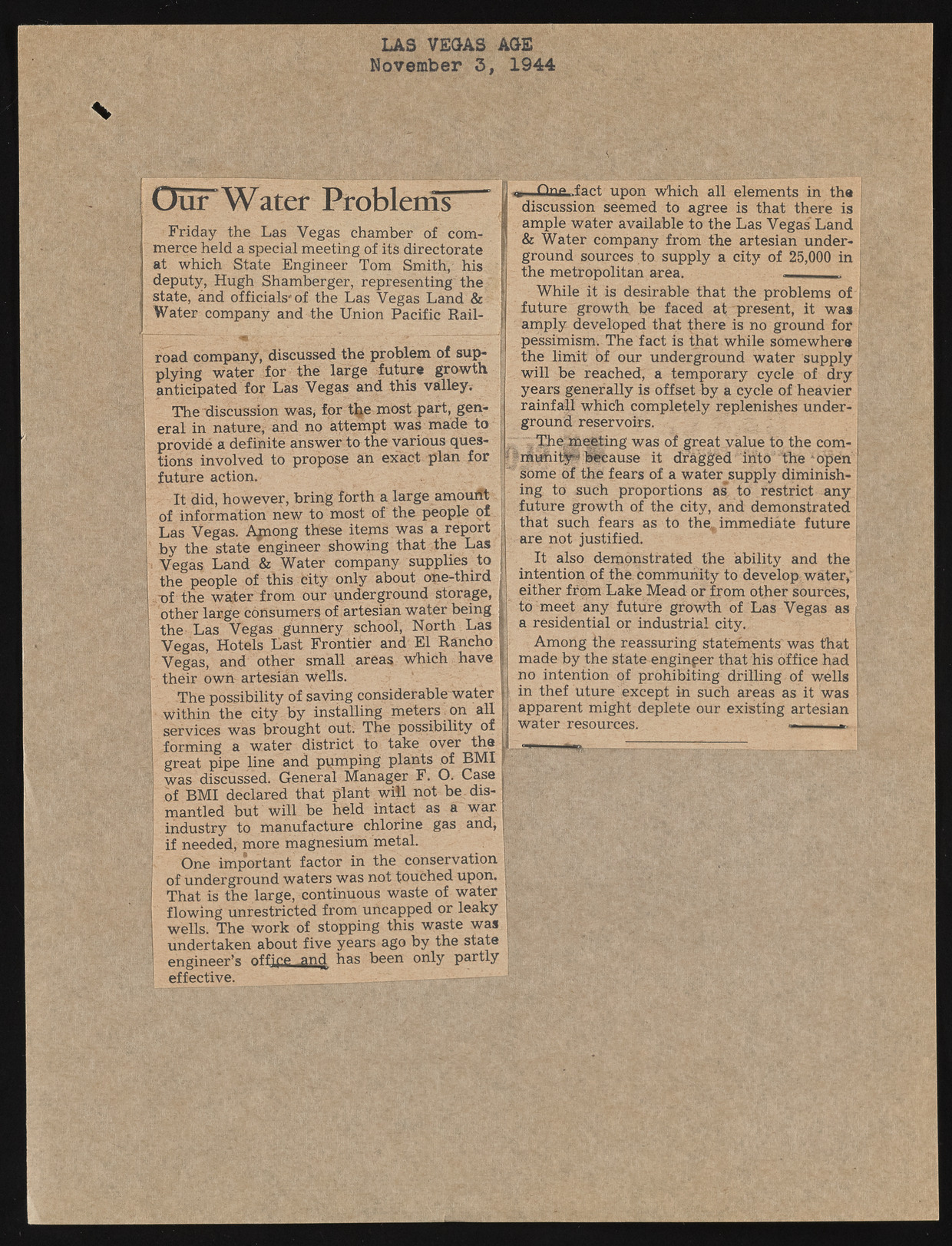Copyright & Fair-use Agreement
UNLV Special Collections provides copies of materials to facilitate private study, scholarship, or research. Material not in the public domain may be used according to fair use of copyrighted materials as defined by copyright law. Please cite us.
Please note that UNLV may not own the copyright to these materials and cannot provide permission to publish or distribute materials when UNLV is not the copyright holder. The user is solely responsible for determining the copyright status of materials and obtaining permission to use material from the copyright holder and for determining whether any permissions relating to any other rights are necessary for the intended use, and for obtaining all required permissions beyond that allowed by fair use.
Read more about our reproduction and use policy.
I agree.Information
Digital ID
Permalink
Details
More Info
Rights
Digital Provenance
Publisher
Transcription
LAS VEG-AS AGE November 3, 1944 % Our W ater Problems V Friday the Las Vegas chamber of com- | merce held a special meeting of its directorate J at which State Engineer Tom Smith, his | deputy, Hugh Shamberger, representing the j state, and officials'of the Las Vegas Land & I Water company and the Union Pacific Rail- { road company, discussed the problem of sup- j plying water for the large future growth anticipated for Las Vegas and this valley. The discussion was, for tfce most part, gen- [ • eral in nature, and no attempt was made to F 3 provide a definite answer to the various ques- r 3 tions involved to propose an exact plan for 1 future action. It did, however, bring forth a large amoulft j of information new to most of the people of. I Las Vegas. Ajnong these items was a report I * by the state engineer showing that the Las j Vegas Land & Water company supplies to the people of this City only about one-third j 5 -of the water from our underground storage, j §; other large consumers of artesian water being I the-Las Vegas gunnery school, North Las I Vegas, Hotels Last Frontier and El Rancho I i! Vegas, and other small areas which have. I their own artesian Wells. The possibility of saving considerable'water | g Within the city by installing meters , on all services was brought out. The possibility of I i forming a water district to take over the y ?3 great pipe line and pumping plants of BMI f 3'a was discussed. General Manager F. O. Case | of BMI declared that plant wifi not be dis-mantled but will be held intact as a war. ] industry to manufacture chlorine gas and, F if needed, more magnesium metal. One important factor in the conservation of underground waters was not touched upon. That is the large, continuous waste of water flowing unrestricted from uncapped or leaky : • wells. The work of stopping this waste was ?-1 undertaken about five years ago by the state engineer’s office anijl has been only partly ! effective. v Onp, fact upon which all elements in the discussion seemed to agree is that there is ample water available to the Las Vegas' Land & Water company from the artesian underground sources to supply a city of 25,000 in the metropolitan area. - While it is desirable that the problems of future growth be faced at present, it was ! amply developed that there is no ground for j pessimism. The fact is that while somewhere | the limit bf our underground water supply; will be reached, a temporary cycle of dry i years generally is offset by a cycle of heavier i rainfap which completely replenishes under- j ground reservoirs. | ^The;meeting was of great value to the com- 3rmahit’jN because it dragged1 into the ‘ open] 1 Sbrrie of the fears of a water-supply diminishing to such proportions as to restrict any future growth of the city, and demonstrated that such fears as to the% immediate future are not justified. It also demonstrated the ability and the S' intention of the. community to develop water,'] either from Lake Mead or from other sources, [ to meet any future growth of Las Vegas as a residential or industrial city. Among the reassuring statements' was that made by the state engineer that his office had no intention qf prohibiting drilling of wells in thef uture except in such areas as it was apparent might deplete our existing artesian water resources. ~ .

